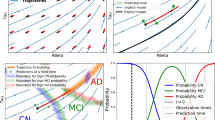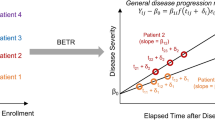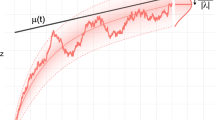Abstract
McCORMICK1 recently formulated the following hypothesis: “All naturally occurring phenomena proceed according to exponential functions of time and each process in Nature conforms to its own unique time-scale”. He finds that the empirical equation  describes a variety of different processes arid that the values of the constants k and c are characteristic of the particular process. Fremlin2 points out that for any natural phenomenon the value of t must be subjected to an arbitrary cut-off at some finite value and that this kind of law is usually restricted to processes which occur under controlled conditions. In replying to Fremlin's2 objection that equation (1) is incapable of describing periodic phenomena, McCormick3 concedes that in such situations a series of exponential growth and decay functions are needed, each valid within certain limits of t.
describes a variety of different processes arid that the values of the constants k and c are characteristic of the particular process. Fremlin2 points out that for any natural phenomenon the value of t must be subjected to an arbitrary cut-off at some finite value and that this kind of law is usually restricted to processes which occur under controlled conditions. In replying to Fremlin's2 objection that equation (1) is incapable of describing periodic phenomena, McCormick3 concedes that in such situations a series of exponential growth and decay functions are needed, each valid within certain limits of t.
This is a preview of subscription content, access via your institution
Access options
Subscribe to this journal
Receive 51 print issues and online access
$199.00 per year
only $3.90 per issue
Buy this article
- Purchase on Springer Link
- Instant access to full article PDF
Prices may be subject to local taxes which are calculated during checkout
Similar content being viewed by others
References
McCormick, N. G., Nature, 208, 334 (1965).
Fremlin, J. H., Nature, 211, 1107 (1966).
McCormick, N. G., Nature, 211, 1108 (1966).
Burch, P. R. J., in Brit. J. Psychiat., 110, 808 (1964).
Burch, P. R. J., in Radiation and Ageing (edit. by Lindop, P. J., and Sacher, G. A.), 117 (Taylor and Francis, London, 1966).
Burch, P. R. J., in Handbook of Clinical Neurology (edit. by Vinken, P. J., and Bruyn, G. W.) (in the press, 1967).
Burch, P. R. J., in Third International Pfizer Symposium on Rheumatic Diseases (in the press, 1967).
Burch, P. R. J., and Rowell, N. R., Amer. J. Med., 38, 793 (1965).
Burch, P. R. J., and Rowell, N. R., Acta Derm. Venereol., 45, 366 (1965).
Burch, P. R. J., and Jackson, D., Brit. Dent. J., 120, 127 (1966).
Burch, P. R. J., J. Theor. Biol., 12, 397 (1966).
Burnet, F. M., in The Clonal Selection Theory of Acquired Immunity (Cambridge Univ. Press, London, 1959).
Burnet, F. M., Brit. Med. J., i, 338 (1965).
Burnet, F. M., and Holmes, M. C., Nature, 207, 368 (1965).
Burwell, R. G., Lancet, ii, 69 (1963); Burch, P. R. J., and Burwell, R. G., Quart. Rev. Biol., 40, 252 (1965).
Novick, A., and Szilard, L., Proc. US Nat. Acad. Sci., 36, 708 (1950).
Author information
Authors and Affiliations
Rights and permissions
About this article
Cite this article
BURCH, P. Nature's Time-scale: Degenerative Disease in Man. Nature 216, 298–299 (1967). https://doi.org/10.1038/216298b0
Received:
Issue Date:
DOI: https://doi.org/10.1038/216298b0
This article is cited by
-
Down's Syndrome and Maternal Age
Nature (1969)
Comments
By submitting a comment you agree to abide by our Terms and Community Guidelines. If you find something abusive or that does not comply with our terms or guidelines please flag it as inappropriate.



